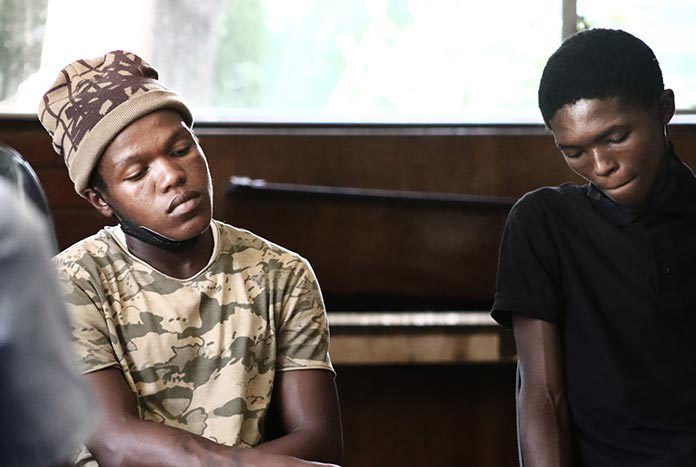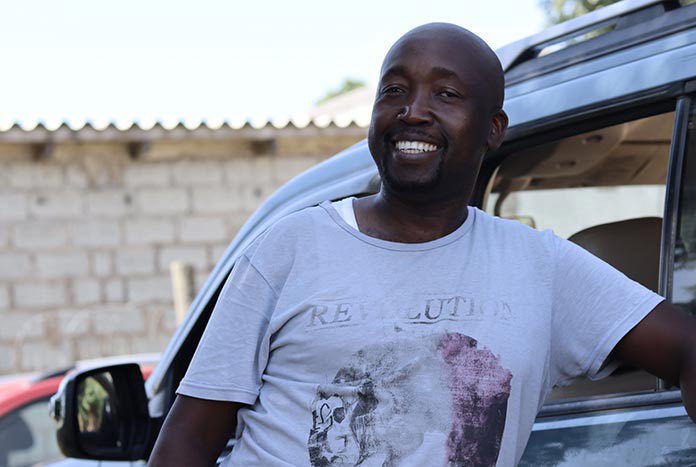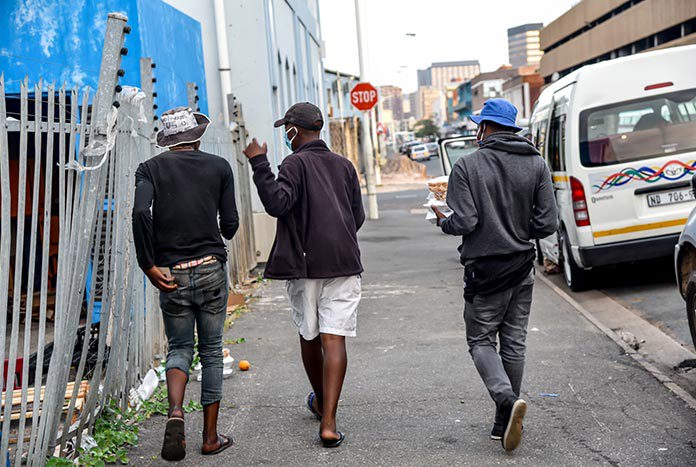Subscribe to ‘Words Of Hope’
Get our emails direct to your Inbox with updates about all our campaigns, trips and events.
Lindo (below left) and Mpendulo (below right) from Amos partner Umthombo Street Children visited the UK from Durban, South Africa, in May this year. As well as visiting supporters nationwide, they spent time in Tower Hamlets, London, with a former Umthombo volunteer. Karin Joseph writes.

Stories of Hope
Doing Hope in... South Africa (and Tower Hamlets)
Read more about Umthombo here.
“Being there, seeing our approaches with young people play out elsewhere in the world, was really a ‘wow’ moment!” Mpendulo Nyembe, Umthombo.
Mpendulo and Lindo from Amos partner Umthombo Street Children visited the UK from Durban, South Africa, in May this year. As well as visiting supporters nationwide, they spent time in Tower Hamlets, London, with a former Umthombo volunteer, Jos. Following his time working in Durban before the pandemic, Jos set up a programme for young men in the east London borough based on Umthombo’s post-16 programme.
Umthombo’s post-16 programme has been running since 2010. It takes a small-group residential approach with boys and young men over 16 who have been involved in Umthombo’s programmes through street outreach or referred to their services from partner organisations. Over 12 weeks, they go through a carefully planned programme of support with substance misuse, working through their trauma, life skills, work readiness and employability training, and when ready, work placements and support with independent living or returning to family.

Reflection: Participants in Umthombo’s post-16 programme take part in a reflective session with the team.
— — — — — — —
Jos, a teacher from the UK, volunteered with Umthombo in 2018 and was placed in the post-16 programme with its programme lead, Magwaza. He was responsible for documenting the methodology and steps of the programme in detail.
Since returning to the UK, Jos has continued working in schools in east London as a maths teacher with a particular interest in young people at risk of exclusion. Outside of his work in schools, Jos has piloted and established a programme called the Oak Project in Bethnal Green, based on the methodology he experienced at Umthombo.
Umthombo’s post-16 programme has been running since 2010. It takes a small-group residential approach with boys and young men over 16 who have been involved in Umthombo’s programmes through street outreach or referred to their services from partner organisations.
For Jos, the most transformative part of his time with Umthombo was the residential approach taken within the post-16 programme, where from Monday to Friday, the participants would all stay together, go for runs in the morning, and eat all meals together, creating a solid routine which then allowed the space for a relaxed and informal atmosphere and relationships of trust to be built.
“I remember sitting in one staff meeting in particular, which was nearly 3 hours long (and also all in Zulu!), where I started to dream up how we could take some of the approaches of Umthombo, and replicate them in some way in England, where I had been working with young people in a PRU (Pupil Referral Unit) who had been excluded from school and had extremely chaotic home lives too.” Jos also noticed how the Umthombo team felt like a family and how the young people felt invited to join.

Facilitation: Magwaza has been facilitating Umthombo’s post-16 programme since 2010.
— — — — — — —
Mpendulo shared that soon after Jos returned to the UK, he got back in touch with Umthombo to say that he wanted to start something similar in London and to ask whether he was permitted to do so. “We gave him the go-ahead. We were delighted there was so much learning for him. We said we would love to hear if it is implemented elsewhere and whether our methods are effective in another location.”
Back in the UK, Jos began drawing a team of people alongside him and developing an idea that could be implemented. He started with a similar model of a 10-week residential programme, but over time, this has been adapted to a shorter, 5-day residential at the start of the process, followed by weekly group sessions and consistent mentoring. Despite a different approach, Jos says that he learnt at Umthombo how a residential element creates strong relationships and breaks through so much at the beginning of the process, enabling trust both ways.
Since returning to the UK, Jos has continued working in schools in east London as a maths teacher with a particular interest in young people at risk of exclusion. Outside of his work in schools, Jos has piloted and established a programme called the Oak Project in Bethnal Green, based on the methodology he experienced at Umthombo.
Jos also shared how the long-term, ongoing relationship of support is essential to success for young people. “How can we support these lads in whatever their next steps are? That’s the idea of the follow-up sessions and the ongoing mentoring, so we still have regular contact with all the boys who have done the programme, trying to help them get into courses, employment, more permanent housing, or get involved in sports — whatever it might be.”
Jos invited Mpendulo and Lindo to join the Oak Project’s Thursday night sessions whilst they were in the UK. Jos was delighted to host those who had inspired him to set up his project and that the young men he worked with in London had the chance to meet the Umthombo team, who they loved. Mpendulo shared that the visit reflected back to him the core values underpinning their work with young people in Durban, including how young people value involvement and connection long after formal participation in a programme may have ended.

Support: Umthombo meets young people where they are on the street, supporting them with practical assistance and psychosocial support.
— — — — — — —
Coming back to South Africa, they continued to reflect on the experience. Although they have become fully independent, some of the boys and girls they work with continue to develop their relationship with Umthombo.
“For example, this past month, we’ve been preparing seven young women to move into independent living. Some of the young people in the post-16 programme from five years ago actually made themselves available to come and assist us in preparing the rooms. Another form of relationship has now developed between us and those formerly involved in post-16. In a way, they are now giving back and ploughing back in what they have learnt in our post-16 programme.”
“How can we support these lads in whatever their next steps are? That’s the idea of the follow-up sessions and the ongoing mentoring, so we still have regular contact with all the boys who have done the programme, trying to help them get into courses, employment, more permanent housing, or get involved in sports — whatever it might be.” Jos — Tower Hamlets, London
Although the context may be vastly different, Jos and Umthombo’s team recognised that the approaches and support young people need from trusted adults resonate worldwide. Despite the wealth of expertise, it is often too rare that UK organisations or practitioners look to the Global South for relevant shared knowledge and inspiration.
Mpendulo said the experience of visiting the Oak Project in the UK was a real encouragement. “Seeing our approaches playing out elsewhere was a ‘wow’ moment — this can really work! Young people are offered a safe space to be themselves without being judged and to come as they are; whether they make mistakes along the way, they still have a safe environment to engage with one another with proper guidance and support from trusted people. This resonates across borders.”
Karin Joseph
— — — — — — —
A Little More...
Words Of Hope E-news
Sign up to receive our regular ‘Words Of Hope’ emails and keep up to date with all the latest Amos news and information, including details of our trips and events, news from our partners around the world and all of our campaigns.
Online reflection
Join us every Tuesday at 5pm for ‘Words Of Hope’ — our online reflection. Simply click here to join us a few minutes beforehand.
Amos Trust
7 Bell Yard, London
WC2A 2JR
UK
Telephone:
+44 (0) 203 725 3493
Email:
[email protected]
Registered Charity No.
1164234

This item has been added to your shopping basket. Please click on the Checkout button below where you can choose your quantity.
Continue shopping Checkout Close